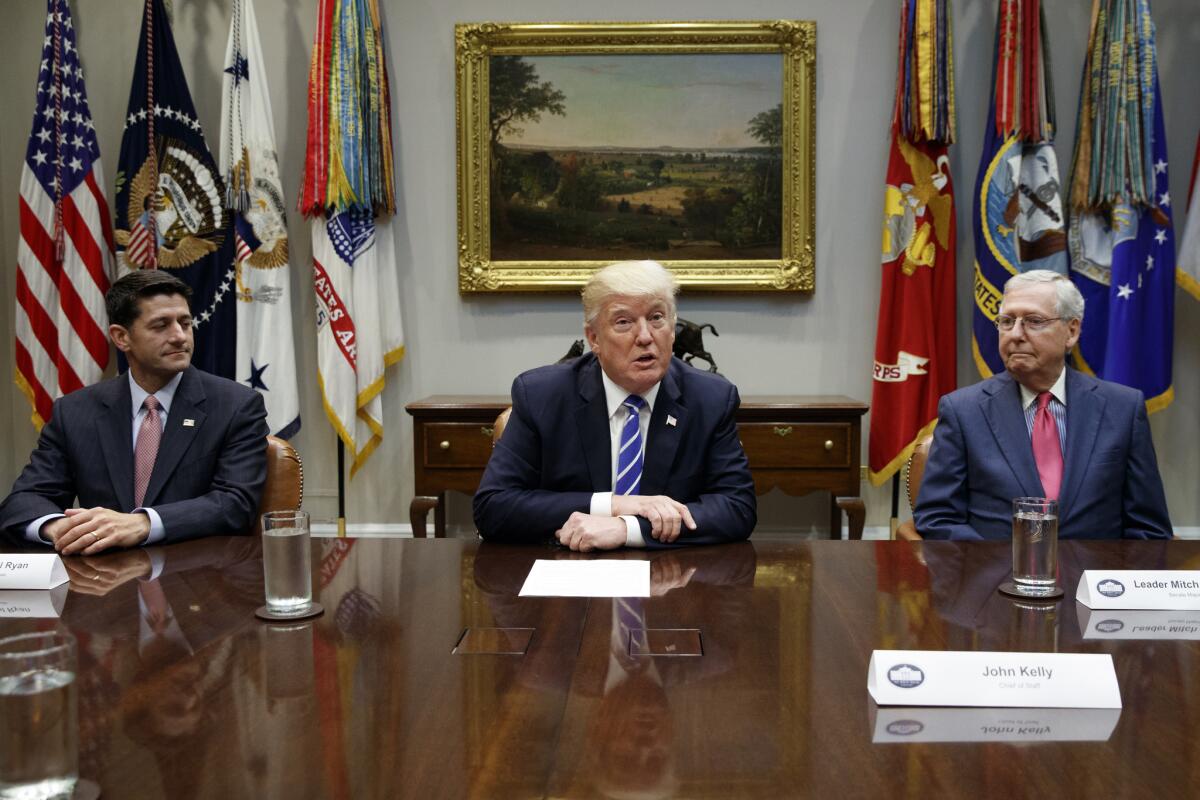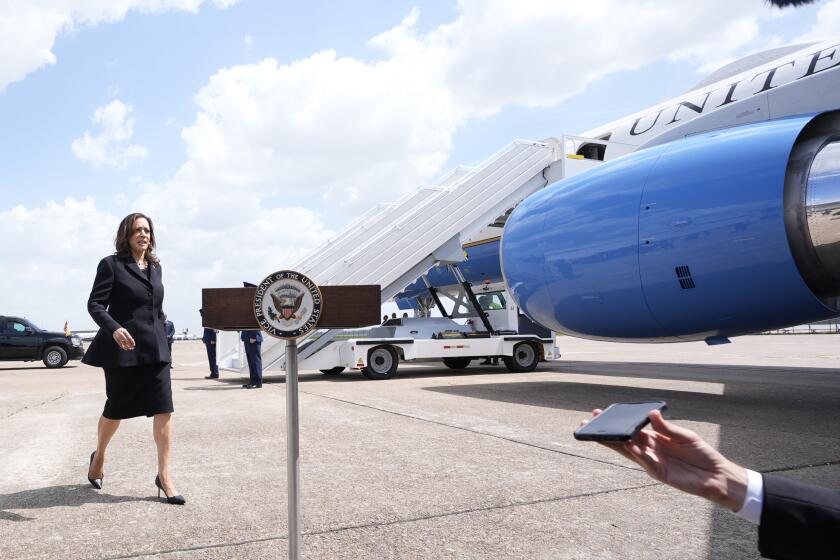Amid the rush to finish GOP tax bill, a sudden slowdown for second thoughts

The rush to finish the GOP tax overhaul has hit a snag as Republicans grapple with substantial differences between the House and Senate bills, and pause to consider unintended consequences of the most massive rewrite of the tax code in a generation.
Lawmakers are eager to pass the bill, President Trump’s top domestic priority, by Christmas. But they are also increasingly wary of political fallout from the hurried process and want to prevent embarrassing moments, such as the scribbled text hastily added to the margin of the final Senate bill.
The end of any major legislative undertaking is often a sprint. But the final stretch of the GOP tax plan is being complicated by an accelerated process like none other in recent history.
“Republicans have made a decision, which I can’t fault them for, that the longer this bill hangs out there, the more barnacles attach,” said Jonathan Traub, the former Republican staff director at the House Ways and Means Committee and now managing principal at Deloitte’s tax policy group.
“We’ve seen time and time again, big issues left out in the sun too long start to attract vultures,” he said. “They need to move quickly to take advantage of the enthusiasm.”
Lawmakers are set to convene Wednesday for the first — and perhaps only — open meeting of a conference committee tasked with reconciling the House and Senate versions of the tax bills.
The Republican staffs met privately over the weekend, and leaders fielded calls with Trump and Treasury Secretary Steven T. Mnuchin, as they cobble together a final version without Democratic input. As the majority in Congress, Republicans are relying on special budget rules to pass the bill on their own to bypass the threat of a Democratic filibuster.
Yet even with control of the House, Senate and the White House, Republicans have struggled to resolve differences over individual income brackets, allowable deductions and when corporate rate cuts will take effect. A hoped-for deal over the weekend did not materialize as talks continued.
The legislation is already bumping against the $1.5-trillion cap Republicans are allowing in deficit spending, but many changes lawmakers want to make — such as reinstating a planned repeal of the medical expenses deduction or shelving an idea to tax graduate student tuition stipends — have left them scrambling to make tweaks elsewhere to pay for them.
One possible change now being debated is whether to nudge the corporate tax rate, now proposed to drop from 35% to 20% in both bills, up to 21% or 22%. There continues to be deep resistance from GOP business allies, even though Trump has said he would be open to it. Such a shift would generate some $200 billion to pay for other provisions of the plan.
The president is set to address the nation Wednesday about the proposal.
Normally at this stage of the legislative process, lawmakers and staff would be poring over the text, trying to catch typos and thinking through the bill’s logic to prevent any unforeseen consequences.
But under the GOP’s fast-track process, the bill is still being written the week before a likely vote.
“Hopefully, in the next few days, we’ll see the final framework,” GOP Whip Steve Scalise (R-La.) said Monday on Fox.
Republicans compare their undertaking to the last major overhaul under then-President Reagan in 1986, sometimes posting photos of themselves from that era to emphasize how long it has been since the last revision.
Senate Majority Leader Mitch McConnell (R-Ky.) and others disregard complaints about the process. Republicans point to how Democrats pushed the Affordable Care Act through the Senate in a Christmas Eve vote and then-House Speaker Nancy Pelosi (D-Calif.) famously suggested that Americans would like the bill once they saw what was in it. Even so, that legislation went though more than a year of hearings, town halls and debates before a final vote.
Though Republicans have been talking about tax reform for years in policy proposals and dozens of congressional hearings, critics say they have not subjected the Tax Cuts and Jobs Act to the kind of legislative scrutiny typical of hundreds-page bills.
The 1986 measure underwent so many hearings that they were numbered, like the Superbowl, with Roman numerals, hitting XXVII at one point, Democrats said.
Democrats note that the 100-year-old state and local tax deduction, first enacted during the Civil War era and reinstated in the early 20th century, barely had a hearing before being put on the chopping block for repeal. After a backlash in high-tax states, the House and Senate bills eventually allowed property tax deductions up to $10,000. Talks are underway to permit that write-off for other kinds of state or local taxes, including income taxes.
“What we’re missing in the process is virtually the entirety of the process,” said Edward D. Kleinbard, a former chief of staff at the congressional Joint Committee on Taxation and now a professor at USC’s Gould School of Law.
Republicans, he said, are “voting for an ideology rather than a tax legislation.”
At one point it seemed the tax bill, after passing the Senate in the early hours of Dec. 2, might be quickly rushed for a House vote. But that momentum has slipped some, as staff and lawmakers, take a second look, making sure the final product is one Republicans can support. Polls so far have found most Americans don’t approve of the bill.
Leaders have little margin for error; they can lose only about 20 Republican votes in the House and no more than two in the Senate, and still be able to pass the bill along party lines.
A Christmas vote would give Republicans a legislative high note to end Trump’s first year in office.
“The desperation is palpable,” said Sen. Ron Johnson (R-Wis.), who continues to raise concerns about the tax treatment of pass-through businesses, and whose vote is not guaranteed.
As the final bill takes shape, GOP leaders must balance the votes of centrists, such as Sen. Susan Collins (R-Maine), whose support is contingent on healthcare votes to ease the tax bill’s repeal of the Obamacare requirement that all Americans have insurance, with deficit hawks such as Sen. Bob Corker (R-Tenn.), who opposed the earlier version for adding too much to the deficit.
Though GOP leaders say the tax cuts will pay for themselves through economic growth, the Joint Committee on Taxation has concluded that both versions would add about $1 trillion to the deficit, even after accounting for expected growth.
A Treasury report Monday sought to assure lawmakers that the cost of the $1.5-trillion package would be more than paid for by future economic growth. But the one-page report was widely criticized because it relied heavily on separate and as-of-yet unannounced future initiatives for infrastructure development and welfare reform.
Senate Minority Leader Charles E. Schumer (D-N.Y.) called the report “fake math.”
Meanwhile, staffers continue going through the bill text, trying to make the needed changes to hold together the sometimes fragile GOP majority, while making sure the long-term policy proposals will be sound.
“You’d think it would easy to hand out $1.5 trillion in tax cuts,” said Traub. “It turns out to be quite difficult.”
Twitter: @LisaMascaro
ALSO:
After last-minute deals, the Senate narrowly passes Republican tax plan
Is this small-town congressman from New Mexico tough enough to win Democrats the House majority?
More to Read
Get the L.A. Times Politics newsletter
Deeply reported insights into legislation, politics and policy from Sacramento, Washington and beyond. In your inbox three times per week.
You may occasionally receive promotional content from the Los Angeles Times.











